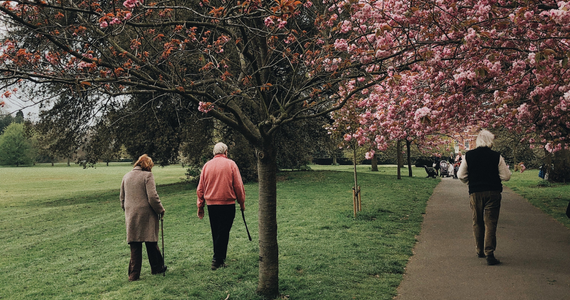Elder abuse was already an issue across the world, however, the pandemic has exacerbated the issue – with more and more people feeling a financial and emotional burden over the last three years.
It is estimated that one in six older people have experienced some form of elder abuse over the last 12 months and financial abuse is sitting around 2 percent of reported elder abuse cases in Australia.
However, Geoff Rowe, Chief Executive Officer (CEO) of Aged and Disability Advocacy Australia (ADA Australia), says it is likely that financial abuse is a lot more pervasive in the community than people realise and that the financial abuse data is not reflective of what ADA sees on the ground.

Why is COVID-19 making financial abuse worse?
Mr Rowe says that COVID-19 has exacerbated a lot of issues for people and increased financial pressures, which may be passed on to older people.
“Older people I think, particularly throughout the pandemic, have been seen as not the highest priority group despite being the most vulnerable group,” explains Mr Rowe.
“What happens behind closed doors without the normal checks and balances is another contributing factor.
“With lockdowns, all the financial pressures on families, [people] lean more on the bank of mum or dad.”
Mr Rowe adds that a big problem with elder abuse, in general, is that older people are reluctant to seek help or report perpetrators because this abuse is often carried out by people they love.
ADA Australia often sees older people blame themselves for the actions of their children, particularly in the case of financial misuse.
Older people have been disconnected from their community and supports more broadly, explains Mr Rowe, which is allowing financial abuse to happen more so than in pre-pandemic times.
Another reason for the financial abuse of elderly people is early inheritance syndrome.
Mr Rowe says that sometimes family members may start thinking that because they need the money now and the older person “doesn’t need it” they can start accessing their inheritance “right here, right now”.
Signs of financial abuse
Spotting financial abuse can be difficult, especially if you are worried about upsetting family members or the victim.
Things that can signal financial abuse include:
-
An older person not being allowed to access their own money
-
A person no longer being able to access any financial accounts
-
Bills are not being paid regularly or often paid late – either by the Enduring Power of Attorney (EPOA) or the older person
-
Expensive or important items are going missing (like your grandmother’s rings or family jewels) or even expensive furniture going missing from your or your older loved one’s home
-
Changed behaviours, like an older person worrying about affording something they do regularly, such as a morning coffee at their favourite cafe
-
Avoiding going to medical appointments or paying for essential items
-
The older person becomes defensive if you ask them about giving money or large gifts to other family members
-
Random or unexpected changes to the person’s banking or important documents
-
Sudden property transfers or selling their house, where previously the older person has indicated they wanted to remain in their home
Another concern for ADA is the misuse of Enduring Power of Attorney (EPOA) powers by family or close friends.
EPOA’s can give certain powers to family members that are meant to assist older people who find certain decisions or tasks difficult. But Mr Rowe says this very system that is meant to protect the vulnerable is also being used incorrectly – whether by accident or not.
You can learn more about financial abuse and other types of abuse in our article, ‘The signs of elder abuse‘.
Where to go for help
If you are concerned you may be experiencing financial abuse, contact an advocacy service or elder abuse service to get the help you need.
An advocacy service can help you understand what your rights are, negotiate on your behalf or empower you self-advocate, set out a plan to help reduce your stress, and give you the right phone numbers for the appropriate supports.
The Older Persons Advocacy Network (OPAN) can help you understand your rights and direct you to the best support services for your situation. You can contact OPAN on 1800 700 600.
If you want to talk to a specific elder abuse service that can provide you with information or advice, contact ELDERHelp on 1800 353 374 and you will be directed to the relevant State or Territory service.
If it is an emergency, contact the police on Triple 000.
You can learn more about elder abuse in our article, ‘Recognise the signs of elder abuse and how to prevent it‘.
*Case studies provided by ADA Australia
Source:
This article was originally published on https://www.agedcareguide.com.au/talking-aged-care/financial-elder-abuse-increased-due-to-the-pandemic-how-can-you-protect-yourself. Reproduced with permission of DPS Publishing.
Important:
This provides general information and hasn’t taken your circumstances into account. It’s important to consider your particular circumstances before deciding what’s right for you. Although the information is from sources considered reliable, we do not guarantee that it is accurate or complete. You should not rely upon it and should seek qualified advice before making any investment decision. Except where liability under any statute cannot be excluded, we do not accept any liability (whether under contract, tort or otherwise) for any resulting loss or damage of the reader or any other person.
Any information provided by the author detailed above is separate and external to our business. Our business does not take any responsibility for any action or any service provided by the author. Any links have been provided with permission for information purposes only and will take you to external websites, which are not connected to our company in any way. Note: Our company does not endorse and is not responsible for the accuracy of the contents/information contained within the linked site(s) accessible from this page.



